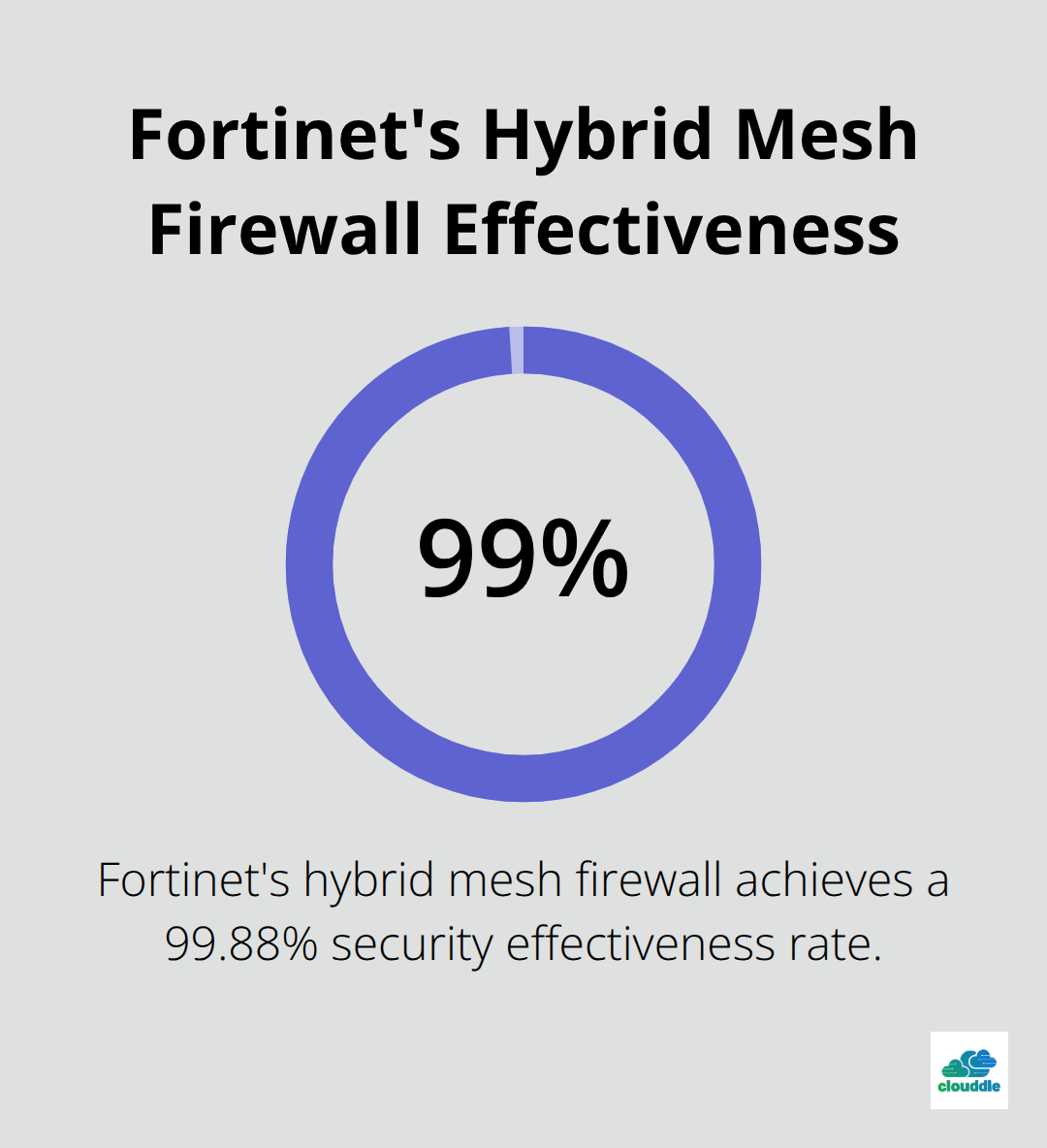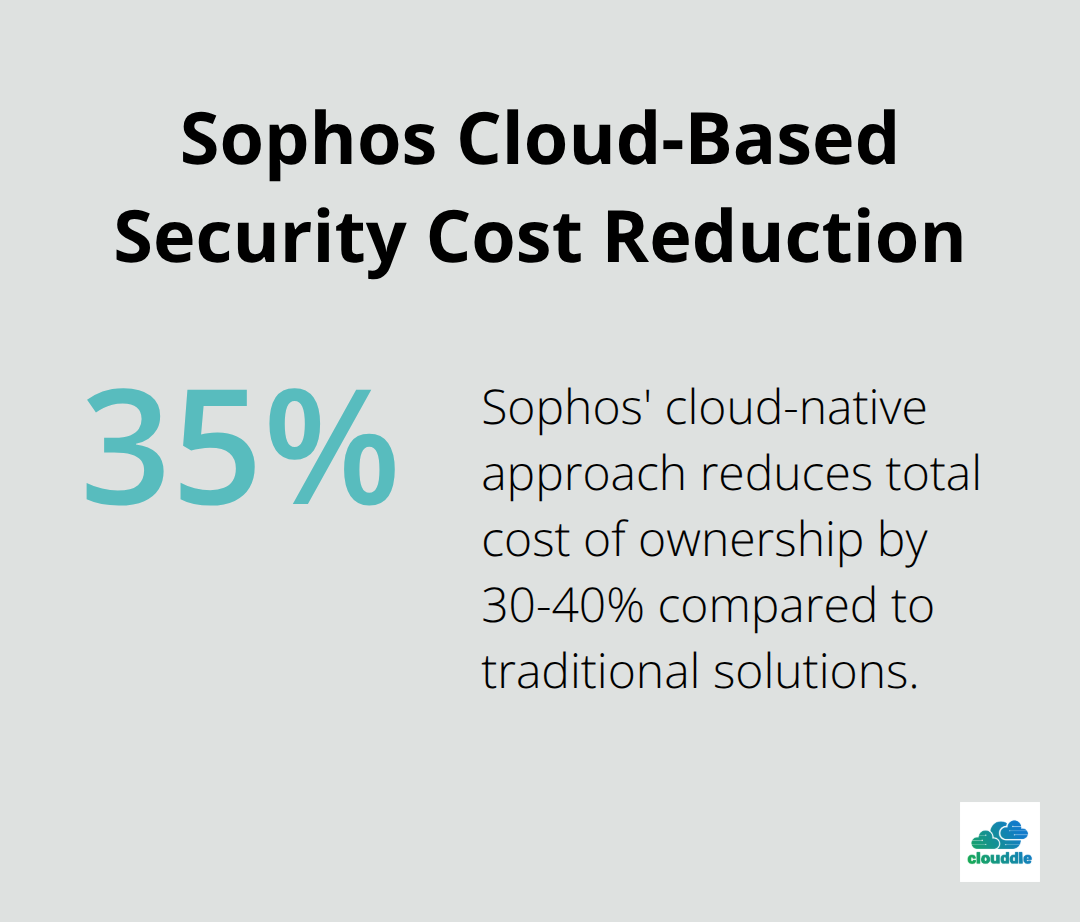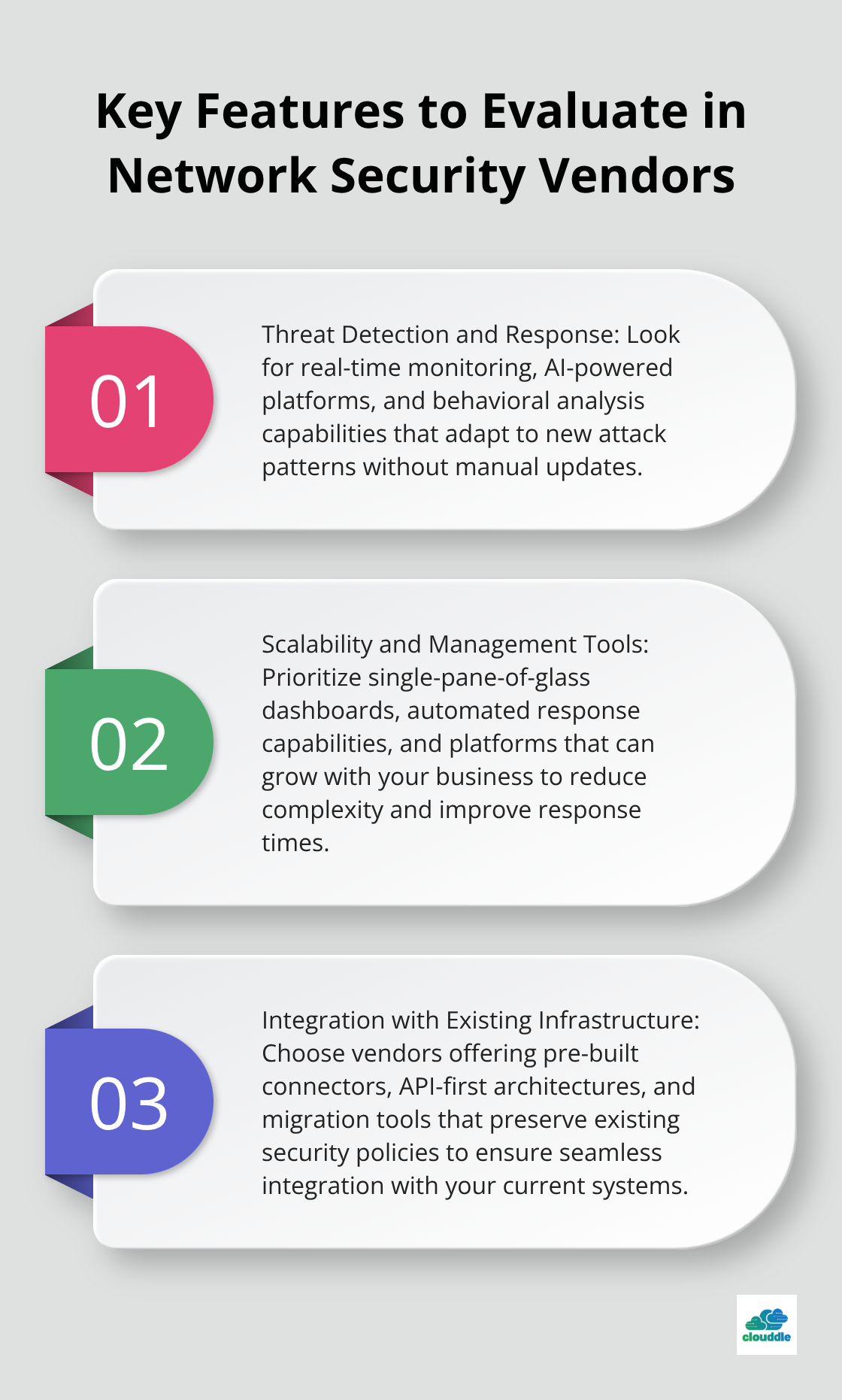Cyberattacks cost businesses $4.45 million on average in 2023, making robust network protection non-negotiable. The right network security vendors can mean the difference between staying operational and facing devastating breaches.
We at Clouddle have analyzed the leading providers to help you make an informed decision. This guide breaks down the top enterprise and specialized vendors, plus the key features you should evaluate before choosing your security partner.
Leading Enterprise Network Security Vendors
Cisco Security Solutions and Market Position
Cisco dominates the enterprise security market with a commanding presence that stems from its $28 billion acquisition of Splunk and deep integration capabilities with existing network infrastructure. The company’s security portfolio generates substantial revenue growth, which positions it as a visionary according to Gartner’s 2024 Magic Quadrant assessments. Cisco’s strength lies in its ability to seamlessly integrate security solutions with established network environments. This makes it the go-to choice for large enterprises with complex infrastructures that require comprehensive protection across multiple network layers.
Palo Alto Networks Firewall and Threat Detection
Palo Alto Networks pioneered next-generation firewalls and maintains its leadership position through consistent innovation in threat detection capabilities. The company’s Prisma SASE 3.0 platform delivers enhanced data security and application acceleration, with improved data classification accuracy that outperforms traditional solutions. Their automated security approach across cloud environments provides enterprise-grade protection that scales with business growth. The platform’s real-time threat intelligence helps organizations stay ahead of evolving cyber threats.
Fortinet Integrated Security Fabric Approach
Fortinet’s hybrid mesh firewall achieves an impressive 99.88% security effectiveness rate, which makes it the top choice for network security performance. The company shows projected annual growth of 14.6%, driven by its integrated Security Fabric approach that combines various security measures with AI-powered FortiGuard services. Companies report a 318% return on investment when they use Fortinet solutions (according to Forrester TEI studies), which demonstrates clear financial benefits alongside superior protection capabilities. This proven track record attracts enterprises that need both performance and cost-effectiveness.

While these enterprise giants offer comprehensive solutions, many businesses require more specialized approaches that cater to specific organizational needs and budget constraints. Organizations seeking managed network security services can benefit from expert oversight and continuous monitoring capabilities.
Specialized Network Security Providers
Small and medium businesses need security solutions that balance robust protection with budget constraints and simplified management. SonicWall leads this space with its TZ80 firewall designed specifically for small-office/home-office settings, which integrates zero trust network access and VPN-as-a-service functionalities that eliminate complex configurations.
SonicWall Small to Medium Business Focus
SonicWall focuses exclusively on organizations with fewer than 500 employees and offers pre-configured security appliances that deploy within hours rather than weeks. Their approach removes the complexity that typically burdens smaller IT teams. The company’s latest TZ80 firewall combines multiple security functions into a single device, which reduces both hardware costs and management overhead.
WatchGuard Unified Threat Management
WatchGuard takes a different approach with its unified threat management platform, which combines firewall, intrusion prevention, and web filtering into single appliances that cost 40% less than enterprise alternatives. Their ThreatSync+ NDR enhancement uses AI to streamline threat monitoring and remediation, which reduces the need for dedicated security staff that most SMBs cannot afford. The platform provides comprehensive protection through automated responses that handle threats without human intervention.
Sophos Cloud-Based Security Services
Sophos delivers cloud-based security services that eliminate on-premises hardware requirements entirely, which makes it perfect for businesses with limited IT resources. Their platform maintains high customer satisfaction ratings while it provides endpoint protection, email security, and web filtering through a single management console. The cloud-native approach reduces total cost of ownership by 30-40% compared to traditional solutions. Sophos automatically updates threat intelligence across all connected devices, which means businesses stay protected against new threats without manual intervention or expensive maintenance contracts.

These specialized providers prove that smaller businesses achieve enterprise-grade protection without the complexity or cost barriers. However, selecting the right vendor requires careful evaluation of specific technical capabilities that align with your business requirements. Consider exploring managed network security options and firewall solutions to find the best fit for your organization.
Key Features to Evaluate in Network Security Vendors

Threat Detection and Response Capabilities
Advanced threat detection capabilities separate effective security vendors from basic firewall providers. Real-time monitoring systems process network traffic continuously and identify anomalous behavior within minutes rather than hours. Endpoint Detection and Response solutions monitor every device that connects to your network, while AI-powered platforms like Darktrace’s ActiveAI detect threats that traditional signature-based systems miss entirely.
The most effective vendors combine behavioral analysis with machine learning algorithms that adapt to new attack patterns without manual updates. These systems learn from network behavior patterns and flag deviations that indicate potential security breaches.
Scalability and Management Tools
Management complexity destroys security effectiveness in real-world deployments. Single-pane-of-glass dashboards consolidate alerts from multiple security tools and reduce response times by 60% according to recent industry studies. Automated response capabilities handle routine threats without human intervention, which proves essential when organizations face increasing cyber threats.
Scalable platforms that grow with your business eliminate costly migrations and reduce training requirements for IT staff. Cloud-native solutions adapt to increased traffic loads automatically, while hybrid approaches accommodate both current needs and future expansion plans.
Integration with Existing Infrastructure
Integration with existing infrastructure determines deployment success more than feature lists. Vendors that offer thousands of pre-built connectors like IBM Security Verify reduce implementation timeframes from months to weeks. API-first architectures allow custom integrations with legacy systems that many businesses cannot replace immediately.
Cloud-native solutions integrate seamlessly with modern infrastructure while hybrid approaches accommodate organizations with both on-premises and cloud environments. The best vendors provide migration tools that preserve existing security policies during transitions (which saves months of reconfiguration work).
Final Thoughts
Network security vendors require careful evaluation that balances protection capabilities with business requirements and budget constraints. Enterprise organizations benefit from Cisco’s infrastructure integration, Palo Alto Networks’ advanced threat detection, or Fortinet’s proven 99.88% effectiveness rate. Small and medium businesses find better value with SonicWall’s simplified management, WatchGuard’s unified approach, or Sophos’ cloud-native solutions.
Focus on vendors that offer real-time threat detection, scalable management tools, and seamless integration with your existing systems. The average data breach costs $4.45 million, which makes this investment essential rather than optional. Companies that use advanced security solutions report 318% ROI (proving that proper protection pays for itself).
Start with an assessment of your current infrastructure and identify specific security gaps. Request demonstrations from shortlisted vendors and evaluate their response capabilities during simulated attacks. For businesses that seek comprehensive technology solutions beyond security, Clouddle provides managed IT services with 24/7 support and flexible contracts that eliminate upfront investments while maintaining reliable connectivity.


